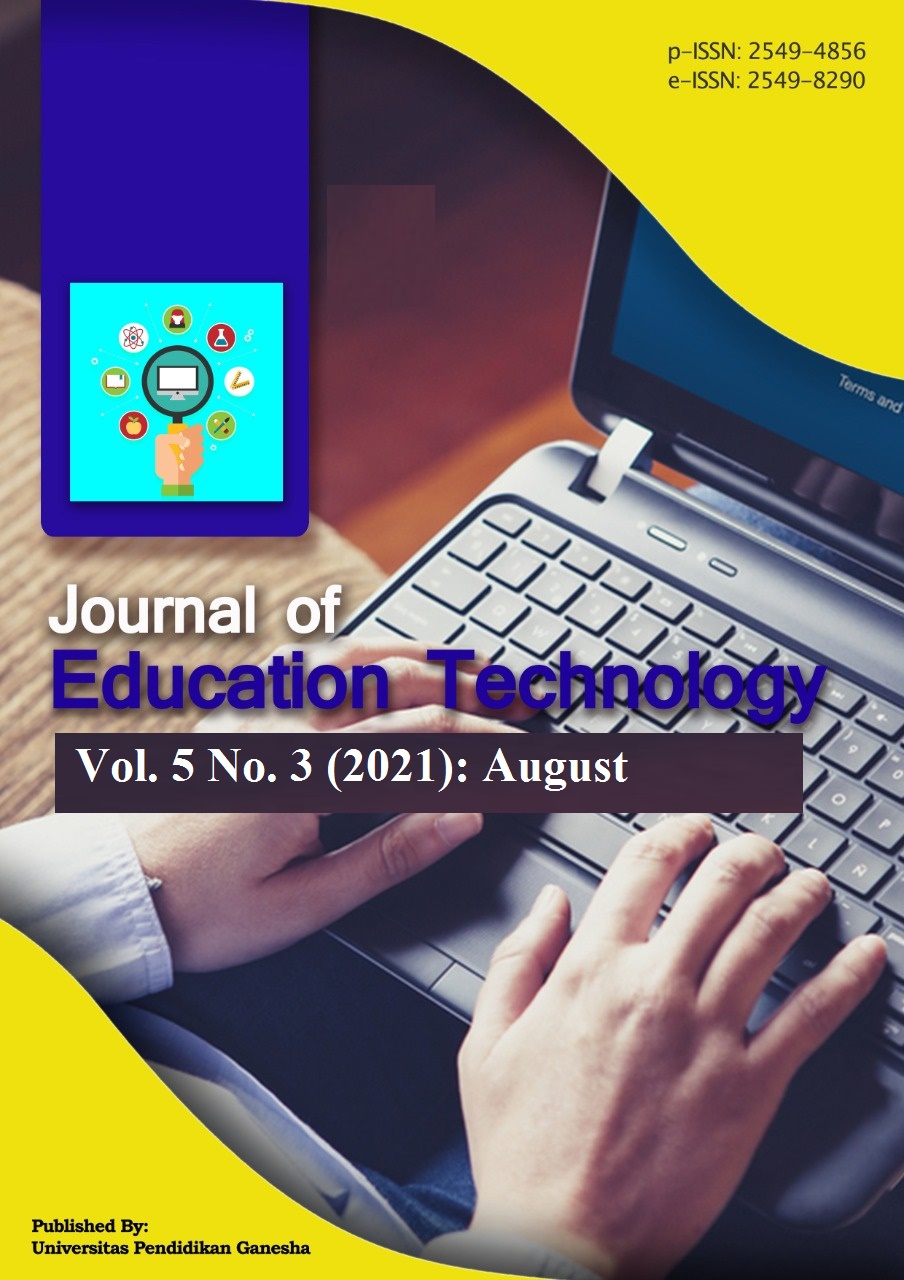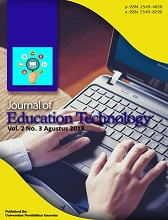Development of Flipped Classroom Learning Combined with Google Classroom and Video Conference to Improve Students’ Learning Independent and Mathematics Learning Outcomes
DOI:
https://doi.org/10.23887/jet.v5i3.34466Keywords:
Flipped Classroom, Google Classroom, Video Conference, Independent Learning, Mathematics Learning OutcomesAbstract
The problem of this research arises from learning independent is a crucial part needed in learning which then gives certain influence toward learning outcome; hence a right strategy is needed to gain it. This study was developmental study toward flipped classroom learning aiming at: analyzing the validity, practicality and the effectiveness of flipped classroom learning combined with google classroom and video conference. This study was based on ADDIE model. In accordance to the subject of this study, there were three experts in developing learning administrations and two experts in developing learning media in validating stage and 32 students from Junior High School in implementing stage. The results of this research in terms of quantitative findings revealed that the validity of learning administration was worth to be implemented with validity average of lesson plan was around 88,10%, teaching materials was around 90,00%, evaluation instrument was 90,48% and learning media was 90,00 % and those result was categorized into very worth-implementing. The practicality of flipped classroom seen from the questionnaire result showed that students’ respond gained 3,22 which could be categorized into high category, and teachers’ respond was at 3,70 which can be categorized into very high category. In term of learning independent, an improvement was also found, where before learning an average of 2.49 with the low category, and after learning 2.90 with the high category. The result of gain-analysis showed that the gained score reached 0,44 which could be categorized into medium. This result could be categorized into quite effective in improving the students’ math learning outcome. Based on the result gained during the data analysis, it could be concluded that flipped classroom combined with google classroom and video conference was effective in improving students’ learning independent and mathematics learning outcomes.References
Albashtawi, A. H., & Al Bataineh, K. B. (2020). The effectiveness of google classroom among EFL students in Jordan: An innovative teaching and learning online platform. International Journal of Emerging Technologies in Learning, 15(11), 78–88. https://doi.org/10.3991/IJET.V15I11.12865
Ayu, D., Manu, M., & Priantini, O. (2020). The Development Of Teaching Video Media Based On Tri Kaya Parisudha In Educational Psychology Courses. Journal of Education Technology, 4, 448–455.
Baya’a, N., Daher, W., & Anabousy, A. (2019). The development of in-service mathematics teachers’ integration of ICT in a community of practice: Teaching-in-context theory. International Journal of Emerging Technologies in Learning, 14(1), 125–139. https://doi.org/10.3991/ijet.v14i01.9134
Darmawan, W., Kuswandi, D., & Praherdhiono, H. (2020). Pengaruh Blended Learing Berbasis Flipped Classroom pada Mata Pelajaran Prakarya Terhadap Hasil Belajar Siswa Kelas X SMK. Jurnal Kajian Teknologi Pendidkan, 5, 170–179.
Fathullah, S. A. Z. (2020). Penggunaan Model Pembelajaraan Blended Learning pada Era Revolusi Industri 4.0. SOCIUS: Jurnal Pendidikan Dan Pembelajaran Ilmu Pengetahuan Sosial, 9(1), 61–70.
Firmansyah, D. (2013). Strategi Pembelajaran Dan Minat Belajar Terhadap Hasil Belajar Matematika. Jurnal Teknologi Pendidikan (JTP), 6(2), 34–44. https://doi.org/10.24114/jtp.v6i2.4996
Guswara, A. M. (2020). The Contribution of Google Classroom Application and Motivation to The Learning Outcomes of Web Programming. Educational Technology, 4(4), 1–9. https://ejournal.undiksha.ac.id/index.php/JET/article/view/29896
Igirisa, N. (2017). Pengaruh Model Flipped Learning Terhadap Hasil Belajar Matematika Ditinjau Dari Gaya Belajar Siswa. Journal of Chemical Information and Modeling, 2(9), 1689–1699.
Irodah, P. A., Khoiriyah, H., Batul, Z., Maulidasilvi, R., Setyawan, D., & Nyono, N. (2020). Revolusi Industri 4 . 0 : Tranformasi Media belajar e-learning menggunakan framework. Prosiding Seminar Nasional V 2019, 2015, 368–377.
Kurniawati, M., Santanapurba, H., & Kusumawati, E. (2019). Penerapan Blended Learning Menggunakan Model Flipped Classroom Berbantuan Google Classroom Dalam Pembelajaran Matematika Smp. EDU-MAT: Jurnal Pendidikan Matematika, 7(1), 8–19. https://doi.org/10.20527/edumat.v7i1.6827
Lase, D. (2016). Pendidikan di Era Revolusi Industri 4.0. Journal Sunderman, 1(1), 28–43. 10.1109/ITHET.2016.7760744
Li, J., Zhang, X., & Hu, Z. (2018). The design and application of flip classroom teaching based on computer technology. International Journal of Emerging Technologies in Learning, 13(10), 95–107. https://doi.org/10.3991/ijet.v13i10.9453
Mirlanda, E. P., Nindiasari, H., & Syamsuri, S. (2019). Pengaruh Pembelajaran Flipped Classroom Terhadap Kemandirian Belajar Siswa Ditinjau Dari Gaya Kognitif Siswa. Symmetry: Pasundan Journal of Research in Mathematics Learning and Education, 4, 38–49. https://doi.org/10.23969/symmetry.v4i1.1638
Montolalu, C., & Langi, Y. (2018). Pengaruh Pelatihan Dasar Komputer dan Teknologi Informasi bagi Guru-Guru dengan Uji-T Berpasangan (Paired Sample T-Test). D’CARTESIAN, 7(1), 44. https://doi.org/10.35799/dc.7.1.2018.20113
Nonthamand, N. (2020). Guideline to develop an instructional design model using video conference in open learning. International Journal of Emerging Technologies in Learning, 15(3), 140–155. https://doi.org/10.3991/ijet.v15i03.10842
Nugroho, W. (2016). FLIPPED CLASSROOM LEARNING PADA PEMBELAJARAN MATEMATIKA BI-LINGUAL UNTUK MENUMBUHKAN KEMANDIRIAN BELAJAR. Jurnal Ilmiah Edukasi Matematika, 2(May), 254–270.
Pebriyanti, S., Wena, M., & Payadnya, A. (2020). PERBEDAAN HASIL BELAJAR MATEMATIKA SISWA YANG DIAJAR DENGAN STRATEGI PEMBELAJARAN FLIPPED CLASSROOM DAN KONVENSIONAL. Mahasaraswati Seminar Nasional Pendidikan Matematika (MAHASENDIKA), 15–25.
Purwitha, D. G. (2020). Model Pembelajaran Flipped Calssroom sebagai Pembelajaran Inovatif Abad 21. Jurnal Pendidikan Dasar, 5(1), 49–55.
Rahmat, I. (2020). Implementasi Andragogi Platform E-learning pada Blended Learning di Universitas Negeri Padang. Journal of Education Technology, 4(2), 133. https://doi.org/10.23887/jet.v4i2.24817
Rahmelina, L., Firdian, F., Maulana, I. T., & Aisya, H. (2019). The Effectiveness of The Flipped Classroom Model Using E-Learning Media in Introduction to Information Technology Course. International Journal of Emerging Technologies in Learning, 14(44 1), 148–162.
Ranti, M. G., Budiarti, I., & Trisna, B. N. (2017). Pengaruh Kemandirian Belajar (Self Regulated Learning) Terhadap Hasil Belajar Mahasiswa Pada Mata Kuliah Struktur Aljabar. Math Didactic, 3(1), 75–83. https://doi.org/10.33654/math.v3i1.57
Sari, M., Anggoro, B. S., & Sugiharta, I. (2020). Analisis Peningkatkan Kemampuan Pemecahan Masalah Dan Kemandirian Belajar Dampak Flipped Classroom Berbantuan Video Pembelajaran. Nabla Dewantara, 5(2), 94–106. https://doi.org/10.51517/nd.v5i2.228
Sari, T. K. A. (2019). Pengembangan Media Pembelajaran Matematika Berbasis Adobe Flash di SD Negeri 4 Metro Barat. http://repository.metrouniv.ac.id/id/eprint/608/
Sintawati, M., & Indriani, F. (2019). Pentingnya Literasi ICT Guru di Era Revolusi Industri 4.0. Jurnal Ilmiah Pendidikan Matematika, 1(2), 417–422.
Sukmana, A. I. W. I. Y., & Suartama, I. K. (2019). Pengembangan Mobile Learning Berorientasi Model Pembelajaran Flipped Classroom Pada Mata Kuliah Multimedia. Journal of Education Technology, 2(1), 45. https://doi.org/10.23887/jet.v2i1.13808
Suryawan, I. P. P. (2019). Rancang Bangun Dan Implementasi Media Pembelajaran Matematika Berbasis Lectorainspire Dengan Pendekatan Saintifik. Jurnal Santiaji Pendidikan (JSP), 9(2), 177–188. https://doi.org/10.36733/jsp.v9i2.399
Suryawan, I. P. P., & Permana, D. (2020). Media Pembelajaran Online Berbasis Geogebra sebagai Upaya Meningkatkan Pemahaman Konsep Matematika. Prisma, 9(1), 108. https://doi.org/10.35194/jp.v9i1.929
Susanti, L., & Hamama Pitra, D. A. (2019). Flipped Classroom Sebagai Strategi Pembelajaran Pada Era Digital. Health & Medical Journal, 1(2), 54–58. https://doi.org/10.33854/heme.v1i2.242
Wisada, P. D., Sudarma, I. K., & Yuda S, A. I. W. I. (2019). Pengembangan Media Video Pembelajaran Berorientasi Pendidikan Karakter. Journal of Education Technology, 3(3), 140. https://doi.org/10.23887/jet.v3i3.21735
Yamin, M., & Syahrir, S. (2020). Pembangunan Pendidikan Merdeka Belajar (Telaah Metode Pembelajaran). Jurnal Ilmiah Mandala Education, 6(1), 126–136. https://doi.org/10.36312/jime.v6i1.1121
Yuniarti, A., & Radia, E. H. (2020). Development of Comic Mathematics Teaching Materials on Flat- Building Material to Increase Reading Interest in Class IV Elementary School Students. Journal of Education Technology, 4, 415–423.
Downloads
Published
How to Cite
Issue
Section
License
Authors who publish with the Journal of Education Technology agree to the following terms:
- Authors retain copyright and grant the journal the right of first publication with the work simultaneously licensed under a Creative Commons Attribution License (CC BY-SA 4.0) that allows others to share the work with an acknowledgment of the work's authorship and initial publication in this journal.
- Authors are able to enter into separate, additional contractual arrangements for the non-exclusive distribution of the journal's published version of the work (e.g., post it to an institutional repository or publish it in a book), with an acknowledgment of its initial publication in this journal.
- Authors are permitted and encouraged to post their work online (e.g., in institutional repositories or on their website) prior to and during the submission process, as it can lead to productive exchanges, as well as earlier and greater citation of published work. (See The Effect of Open Access)


















